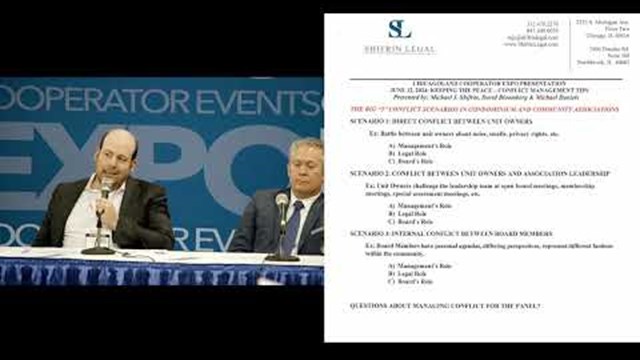When seeking a place to call home, potential co-op and condo buyers are seeking a place of peace and quiet. No one wants to live in the midst of a tempest. And peace and quiet can be both literal and figurative, of course. The constant din of discord and disagreement caused by endless litigation, for example, can be as distracting and destructive to a property’s reputation as the roar of truck traffic day after day.
What long-term effect does the former, more figurative kind of ‘noise’ have on the sustainability and saleability of condo and co-op communities?
The Downside of ‘I’ll See You in Court!’
There’s an old joke about how rich people fight: something to the effect of, ‘You’ll be hearing from my lawyer—he’s more famous than yours!’ The line works for a laugh, but in real life it’s a pretty lousy way to conduct oneself. At best, it alienates others at points when goodwill is a good thing to have. At worst, it can cost all parties involved many thousands of dollars—sometimes even more.
William McCracken is a partner with Ganfer Shore Leeds & Zauderer, a law firm located in New York City that represents many co-op and condo properties. According to him, “There are so many ways that litigation can have negative effects on a property and community. The biggest problem is putting the building’s insurance coverage at risk—especially in today’s increasingly difficult insurance market. A negative loss run can be disastrous for renewing coverage.” But, McCracken cautions, that’s not the only consequence. “A litigious building,” he says, “is just more expensive to run. More frequent calls to the lawyers, more insistence on corporate formalities—because everyone is afraid of being sued. More reluctance to take on big capital projects—even though deferred maintenance is much more expensive in the long run—because board members are reluctant to do anything controversial.”
Richard Brooks, a partner at Marcus, Errico, Emmer & Brooks, a law firm located in Braintree, Massachusetts, agrees. “Excessive litigation can be like a scarlet letter,” he says. Brooks details an unfortunate incident at a condominium complex some years back. “There was a fight over an American flag being draped in a way that it hung over a neighbor’s door. The neighbor got upset, and the offending owner was told to move the flag. It became a cause célèbre. Veterans came to picket the condo. The community developed an unearned reputation as a place where vets wouldn’t want to live, because they don’t treat vets right. It was ugly. It’s a 300-plus-unit condo complex. The optics were terrible.”
Of course, the effects of litigation vary with the types of litigation at issue—between residents, between residents and the board of the association/corporation, or by the board on behalf of the members of the association or corporation against a third party, as in a dispute involving construction defects, for example.
“When litigation involves owners, it can strain relationships,” says Kris Kasten, a partner with Bartzen Rosenlund Kasten, a law firm located in Chicago. “For example, neighbors may resent each other and become uncivil—or more uncivil—toward each other. This can lead to passive-aggressive behavior or outright aggressive behavior, which may only serve to exacerbate the issues involved in the litigation. Furthermore,” continues Kasten, “whether the litigation involves owners or third parties (like a contractor, for example), it can foment distrust of the board. Especially when the litigation is expensive for the association, because it’s not covered by insurance and can drag on for years. Some owners may question the wisdom of such litigation, even when it’s necessary and appropriate for the association to pursue. Such distrust may arise when owners don’t understand the reason or purpose for the litigation. That lack of understanding may be because the board simply does not communicate well with owners—but it can also be because certain information cannot be disclosed for legal reasons.”
The Buyer’s View
One very important consideration at all levels is how litigation might affect future unit sales in a co-op building or condo association. “In the case of suits brought by the association,” says Steve Mlenak, an attorney with Greenbaum Rowe Smith & Davis, a law firm located in Iselin, New Jersey, “[this] should have little impact on salability, unless the association is suing because they were damaged and that information may be frightening to buyers. A good example of this type of lawsuit would be as a result of a construction defect from the developer. Knowledge of the defect, though, could represent another problem. That knowledge could scare buyers away.”
“Litigation that indicates issues with a building’s finances, maintenance and repair, or management can make it more difficult to sell a unit or for a potential purchaser to obtain financing,” says Kristen Pendergrass, of counsel with Seyfarth Shaw, a law firm with offices in New York and internationally. “In addition, any litigation concerning a specific unit may impact an owner’s or shareholder’s ability to sell or refinance, as it can affect the value of the unit. This is particularly true when litigation alleges some sort of physical defect or problem in the unit or adjacent common areas. A large number of ongoing lawsuits, or a lawsuit involving a very high damages claim, can also slow down the sale process after a buyer is involved, because the buyer’s lender will often want to do extensive due diligence.”
Knowledge Is Power
So how much leeway does a board have when it comes to disclosing information to both existing owners and potential buyers? That depends on the type of litigation, its relevance, governing documents, and state laws.
“Most litigation will be required by the building’s accountants to be disclosed in the annual financial statements that every resident will receive annually,” says McCracken. “Prospective buyers always ask about any litigations as part of their normal due diligence. Litigations that get discussed in board meetings will be disclosed in the meeting minutes. And if the dispute is in a court, rather than in a private arbitration, all court records will be publicly available to anyone who wants to look. The bottom line is most litigation should and will be disclosed to residents. What you don’t want to have happen is that the board’s (or the attorney’s) judgment is impaired or encumbered by the fact that the litigation has become a big public issue inside the building. The popular—or the least unpopular—decision in litigation is not always the wisest or most correct decision.”
McCracken goes on to add that he generally doesn’t mind the board disclosing the fact that litigation is ongoing, “because that is something the residents are usually entitled to know anyway, but I rarely recommend trying to litigate a dispute in the public square. This can be hard for some boards to swallow. You very often have a dynamic where there is a dispute with a shareholder or unit owner and that resident sends an ‘open letter’ to their neighbors accusing the board members of all sorts of wrongdoing. There will be pressure from board members to respond in kind and for the board to send out something telling the entire building about what a terrible person the resident is. But you have to be careful—there’s a big difference between correcting the record and getting into a mud wrestling contest.”
Brooks adds that what may or must be disclosed often “totally depends on state law. In California, one must disclose everything. In Massachusetts, you can’t lie, but you aren’t required to disclose. It’s buyer beware in Massachusetts. So, don’t disclose unless you have to. People have to do their own due diligence. If you have a duty to disclose, it often results in more litigation.”
In Illinois, Kasten explains, an association subject to the Condominium Property Act or the Common Interest Community Association Act must disclose the status of any pending suits or judgments in which the association is a party. “That provision is broad and can cover significant and insignificant matters. For example, it can include collection actions against delinquent owners and foreclosure actions in which the association is also a defendant because of its assessment lien rights. Those types of litigation generally have a nominal impact on the association as part of ‘doing business.’ To address those types of litigation, the disclosure may include a general statement about ongoing collection actions but not about specific lawsuits.”
“Typically, litigation is a public record,” says Mlenak. “There are some instances where some records might be sealed. Disclosure is usually required in New Jersey. The knowledge comes from direct communication to residents or residents to buyers. The duty requirement is to tell owners but not prospective buyers. If a buyer doesn’t ask, and the seller doesn’t tell, and they sue the association later, the association will prevail, because in New Jersey, the seller had the responsibility to tell the buyer.”
“In the final analysis,” says Pendergrass, “boards should consult with their counsel to guide them as to how and what to communicate to residents and unit owners or shareholders. While it is understandable that boards may want to be transparent, they should be aware that any communications from board members can be discoverable in litigation and may impact the handling or outcome of the case. Once litigation is underway, it is generally advisable to only confirm the information that is disclosed in the litigation summary provided in the condominium or co-op’s audited financial statement. Those litigation summaries should also be carefully reviewed by counsel before they are approved and released to the condominium or co-op’s accountants for inclusion in the financial statement.”
A J Sidransky is a staff writer/reporter for CooperatorNews and a published novelist. He may be reached at alan@yrinc.com.










Leave a Comment